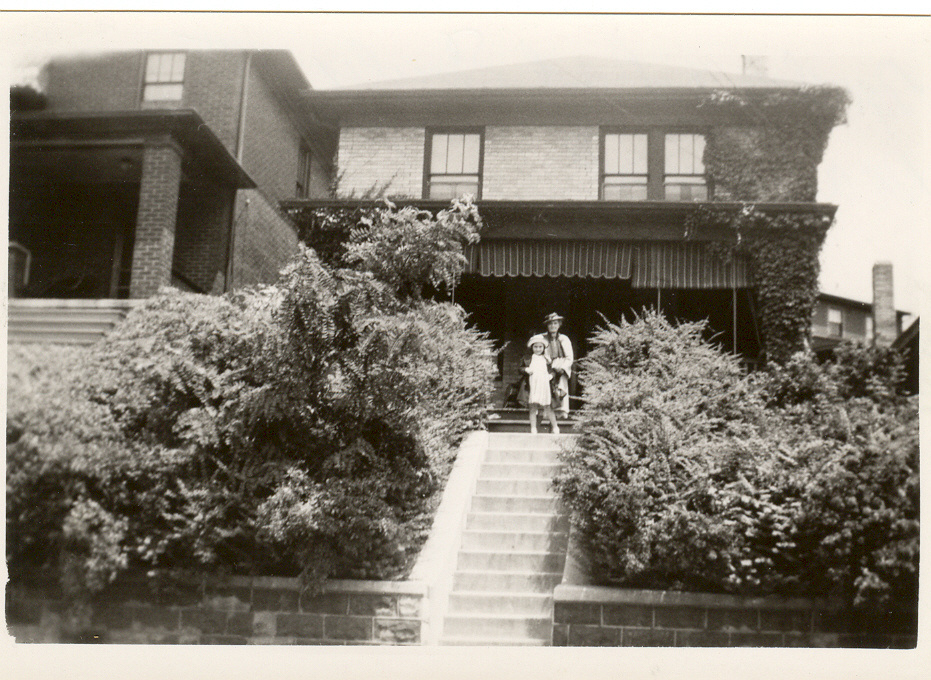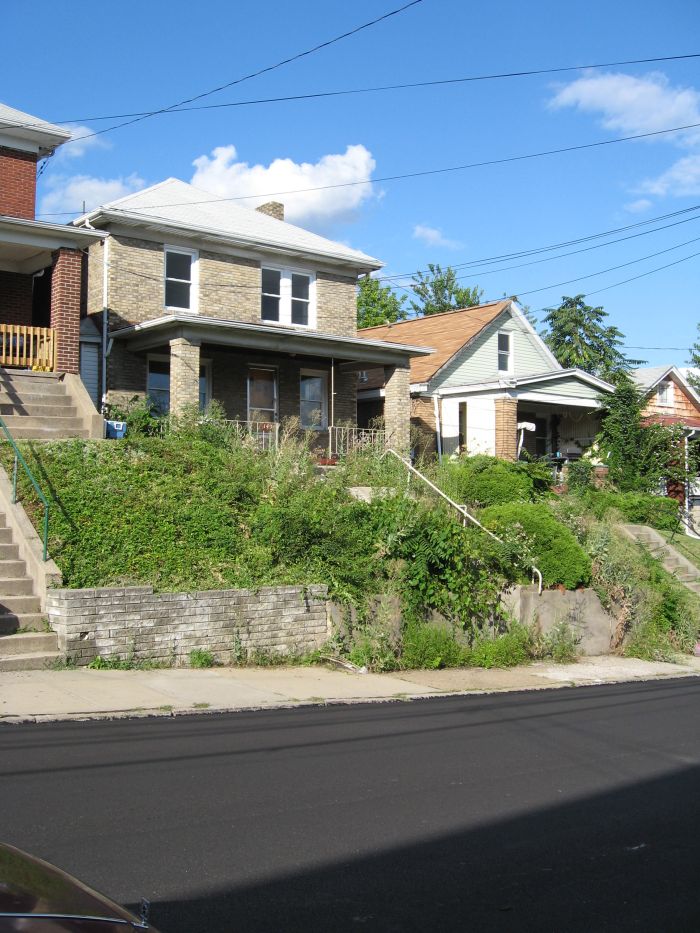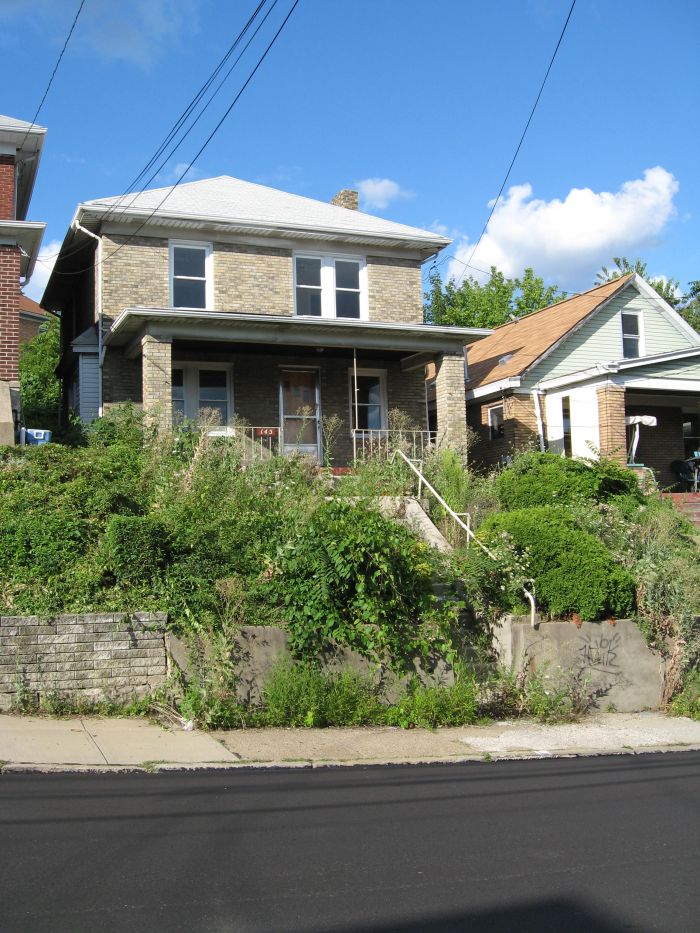Depression Life
Contents
- 1 Story source Pittsburgh Post-Gazette web site, published with permission
- 2 First Person: The Depression in Pittsburgh
- 3 There were lines of ragged men, and Mother's tears
- 4 Saturday, August 09, 2008
- 5 By Emily Pritchard Cary
- 6 1930 Images of 145 Madeline Street
- 7 Emily Prichard Cary with her mother
- 8 145 Madeline Street, 8/15/08
- 9 145 Madeline Street, 8/15/08
Story source Pittsburgh Post-Gazette web site, published with permission
First Person: The Depression in Pittsburgh
There were lines of ragged men, and Mother's tears
Saturday, August 09, 2008
By Emily Pritchard Cary
The verdict is in. This country has begun a free-fall to a recession, which sounds better than depression, but promises to deliver similar shocks. Though but a toddler, my memories of Pittsburgh during the Depression are evergreen.
Pittsburgh was smog-shrouded office buildings ablaze with lights at high noon.
Pittsburgh was the rumble of coal trucks discharging the monthly ton of black diamonds into household bins and the metallic clang of trash trucks collecting ash cans filled with cinders to be scattered on the hilly streets for traction at the next snowfall.
Pittsburgh was FOR RENT and VACANCY signs on every street.
Pittsburgh was the blind man selling pencils at the main entrance to Kaufmann's department store and shoppers dropping coins into his cup. Inside, ceiling lights danced on black marble floors alongside the bank of elevators whisking families to the upper-level auditorium for plays by the WPA Federal Theater Project.
At 145 Madeline St., I leaned over my father's shoulder and sounded out the bold black words on the newspaper banner. "The ... Pittsburgh ... Press." Father's somber expression reflected the disturbing news within its pages.
He was one of the fortunate, thanks to a humane decision by AT&T management to reduce the work week from six to three days rather than lay off employees, but many of our neighbors lost their jobs as the nation's economy deteriorated.
•
The growing ranks of unemployed men touched all tiers of society. Women, once homebodies, sought any menial position to put food on the table. When Mother fell ill, Father -- unable to care for her alone -- advertised for a housekeeper. The next morning, a solemn line of women stretched the two blocks from our house to the trolley stop on Brownsville Road.
The first two candidates were an experienced secretary and a teacher laid off when her school consolidated classes to save money. My parents felt such pity for them, each with an ailing parent to support, that they hired both. The women welcomed the opportunity to share the $5 my parents were able to pay weekly. Mother grieved for the hundreds she turned away.
Her tears flowed often during the Depression. Several times a day, she opened the door to a pathetic soul selling crude pot holders, crocheted doilies or other handmade items.
Many who visited were so down on their luck they had nothing to offer. They were desperate for a slice of bread, a cup of milk, a frayed scarf to bind sore feet. Mother always shared something from our lean cupboards. And she always took time to engage them in conversation.
"These are nice people, just like us," she said. "We must talk with them and listen to their stories so they feel like human beings instead of animals forced to beg."
We learned that they were victims through no fault of their own. Their stories cut so deeply into Mother's heart that she had difficulty choking down our evening meal. She became especially friendly with an elderly man who sold animal figurines his wife made. Once a prosperous lawyer, he lost everything in the stock market. My mother wept the day he reported his wife's death.
He had but one shabby suit, a battered fedora, a small kiln that had supported his wife's hobby and her remaining figurines. When they were gone, he tried to make others, but lacked the skill. His stock exhausted, he was reduced to begging. Each time he labored up the steep steps to our house, he seemed weaker than before. When Mother noticed large holes in his shoes, he gratefully accepted a worn pair of Father's.
During a bitterly frigid spell, the old man disappeared from his rounds. Several weeks passed before vagrants discovered his frozen body in an abandoned coke oven. Mother sobbed over the tiny item in The Press.
•
Still, the hungry, the weary and the hopeless knocked on our door. Many had trudged from distant towns or barren farms hoping to find jobs in the city. Though but a small child, I sensed their deep gratitude for whatever we could spare. "God bless you!" they would cry. The moment she closed the door, Mother burst into tears.
So rampant was the poverty throughout Pittsburgh, it seemed a miracle when construction of Concord School and a post office commenced in our neighborhood. The Press reported that the WPA program for men once teetering near starvation was heralding the end of the nightmare.
"Things are improving everywhere," Father said, as he sat me on his knee to read all about the modern new school I would soon attend.
Emily Pritchard Cary is a writer in Scottsdale, Ariz. (EmpCary@cox.net). First published on August 9, 2008 at 12:00 am Courtesy of Pittsburgh Post-Gazette
1930 Images of 145 Madeline Street
Emily Prichard Cary with her mother
145 Madeline Street, 8/15/08



